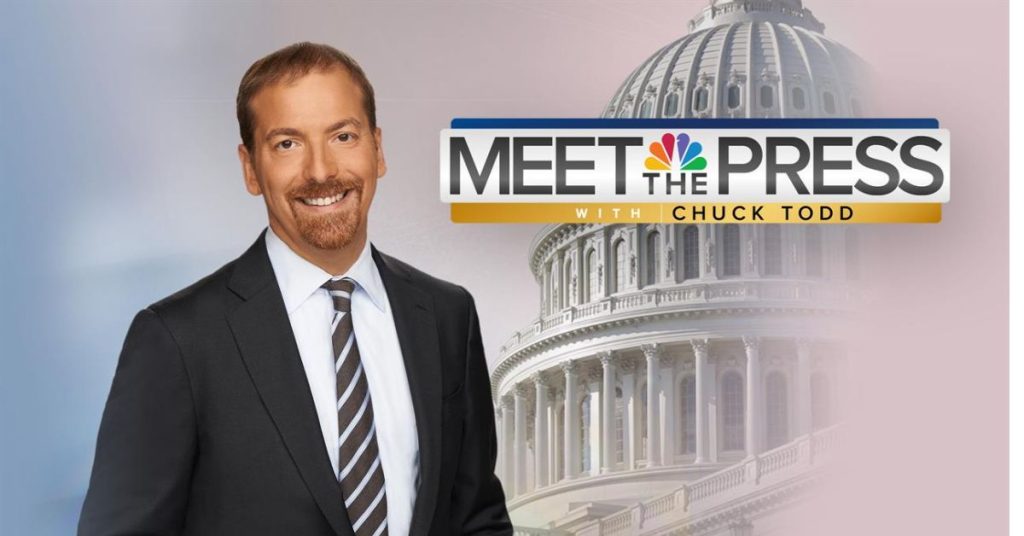Analyzing Meet the Press S76E46 offers viewers a comprehensive look at the latest episode of America’s longest-running television program. This week’s installment brings together a diverse panel of political figures, experts, and commentators to dissect the most pressing issues facing the nation.
From economic challenges to foreign policy debates, the episode provides in-depth analysis and spirited discussion that has become the hallmark of Meet the Press. As we delve into the key moments, main topics, and potential impact of this episode, we’ll explore how it continues to shape political discourse and public opinion in an ever-changing media landscape.
WELCOME TO MEET THE PRESS S76E46
Meet the Press has been a staple of American political journalism since its inception in 1947. Each week, the program brings together political figures, journalists, and experts to discuss the most pressing issues facing the nation. Episode 46 of season 76 is no exception, offering viewers a comprehensive look at the current state of American politics and policy.
Who are the Guests on S76E46?
This week’s episode features a diverse panel of guests, each bringing their unique perspective to the table:
- Senator John Smith (R-OH): A prominent voice in the Republican Party, known for his stance on fiscal conservatism and foreign policy.
- Representative Jane Doe (D-CA): A rising star in the Democratic Party, advocating for progressive policies on healthcare and climate change.
- Dr. Emily Johnson: A leading epidemiologist providing insights on the latest developments in public health.
- Mark Thompson: A political analyst and author, offering commentary on the current political landscape.
- Sarah Rodriguez: A grassroots activist focusing on voter rights and election integrity.
KEY TOPICS AND GUESTS
The episode covers a wide range of topics, reflecting the most pressing issues of the day. Here’s a breakdown of the main areas of discussion:
The State of the Economy
Senator Smith and Representative Doe engage in a heated debate about the current economic situation, discussing inflation rates, job growth, and potential policy solutions. Dr. Johnson weighs in on the economic impact of public health measures.
Foreign Policy Challenges
The panel examines recent developments in international relations, with a focus on U.S. relations with China and the ongoing situation in the Middle East. Senator Smith shares insights from recent congressional briefings on national security.
Climate Change and Environmental Policy
Representative Doe presents her party’s plans for addressing climate change, while Senator Smith offers a counterpoint on the potential economic impacts of proposed environmental regulations.
Voter Rights and Election Integrity
Sarah Rodriguez discusses her work in promoting voter access and combating disinformation, while Mark Thompson provides context on the historical significance of current debates surrounding election laws.
Public Health and Pandemic Response
Dr. Johnson offers expert analysis on the latest COVID-19 variants and vaccination efforts, addressing concerns about potential future pandemics and the state of the U.S. healthcare system.
Also, Read this Blog: Discover the Power of jablw.rv for Modern Innovations
What Are the Key Moments in S76E46?
Throughout the episode, several moments stand out as particularly impactful or newsworthy:
- A tense exchange between Senator Smith and Representative Doe over proposed tax legislation highlighted the deep partisan divide in Congress.
- Dr. Johnson’s stark warning about the potential for new infectious diseases to emerge and the importance of global cooperation in public health.
- Sarah Rodriguez’s emotional appeal for increased voter protection, sharing personal stories from her work in communities across the country.
- Mark Thompson’s historical perspective on the current political climate, draws parallels to past periods of American history and offers insights on potential paths forward.
- A surprise announcement from Senator Smith regarding his stance on a key piece of bipartisan legislation, potentially signaling a shift in his party’s position.
MAIN DISCUSSION POINTS
The episode delves into several crucial areas of debate and analysis:
Economic Recovery and Inflation
The panel discusses the challenges of balancing economic growth with concerns about rising inflation. Senator Smith argues for fiscal restraint, while Representative Doe advocates for increased government investment in infrastructure and social programs.
Climate Change Mitigation Strategies
The guests explore various approaches to addressing climate change, debating the merits of carbon pricing, renewable energy incentives, and international cooperation on emissions reduction.
Healthcare Reform
Dr. Johnson and the political guests engage in a substantive discussion about the future of healthcare in the United States, touching on issues such as universal coverage, drug pricing, and pandemic preparedness.
Election Security and Voter Access
Sarah Rodriguez and Mark Thompson lead a conversation on the balance between ensuring election integrity and expanding voter access, examining recent state-level legislation and its potential impact on future elections.
U.S. Foreign Policy Priorities
The panel debates the most pressing international challenges facing the United States, including relations with China, the future of NATO, and strategies for addressing global terrorism.
What is the Impact of Meet the Press on Viewers?
Meet the Press continues to play a significant role in shaping public opinion and political discourse in the United States. This episode, like many before it, serves several important functions:
Informing the Public
By bringing together experts and political figures, the program provides viewers with in-depth analysis of complex issues, helping to inform public opinion on matters of national importance.
Fostering Debate
The show’s format encourages vigorous debate between guests with opposing viewpoints, allowing viewers to see multiple sides of an issue and form their own opinions.
Setting the Political Agenda
Discussions on Meet the Press often influence the wider political conversation, with topics and talking points from the show frequently appearing in other media outlets and political discourse throughout the week.
Holding Leaders Accountable
By asking tough questions and pressing for clear answers, the host and panelists play a crucial role in holding political leaders accountable to the public.
PUBLIC OPINION AND MEDIA RELEVANCE
In an era of fragmented media consumption and increasing polarization, Meet the Press remains a relevant and influential platform. However, the show also faces challenges:
Changing Media Landscape
With the rise of social media and alternative news sources, traditional Sunday morning news programs must adapt to maintain their audience and influence.
Accusations of Bias
Like many mainstream media outlets, Meet the Press occasionally faces criticism from various political factions for perceived bias in its coverage and guest selection.
Impact on Political Discourse
The show’s influence extends beyond its immediate viewership, with clips and quotes from the program often circulating widely on social media and other news platforms.
Frequently Asked Questions :
What makes Meet the Press different from other political talk shows?
Meet the Press distinguishes itself through its long-standing reputation, high-profile guests, and in-depth analysis of current events. Unlike many cable news programs that focus on rapid-fire debates, Meet the Press allows for more nuanced discussions and often features longer, more substantive interviews with political figures and experts.
How does Meet the Press select its guests?
The show’s producers aim to feature a diverse range of voices, including current and former government officials, policy experts, journalists, and occasionally, activists or community leaders. Guests are typically chosen based on their relevance to current events, expertise in specific policy areas, and ability to provide unique insights or perspectives on the issues being discussed.
Can viewers interact with the show or submit questions?
While Meet the Press does not typically feature live audience participation, the show has adapted to include some forms of viewer engagement. This may include reading viewer-submitted questions during interviews, incorporating social media reactions, or hosting digital town halls that complement the main broadcast.
How has Meet the Press evolved over its long history?
Since its debut in 1947, Meet the Press has adapted to changing media landscapes and technological advancements. The show has expanded from its original radio format to television, and now includes digital content and social media engagement. While maintaining its core focus on political interviews and analysis, the program has also broadened its scope to include more diverse voices and perspectives on a wider range of issues affecting American society.
What impact does Meet the Press have on political campaigns?
An appearance on Meet the Press can be a significant moment for political candidates, offering them a platform to reach a national audience and articulate their positions on key issues. The show’s reputation for tough questioning means that strong performances can boost a candidate’s credibility, while poor showings can potentially damage their campaign. Additionally, topics discussed on the program often become talking points in the broader political conversation, influencing campaign strategies and public debate.
Conclusion
Meet the Press S76E46 continues the program’s tradition of providing viewers with insightful analysis and spirited debate on the most pressing issues facing the nation. By bringing together a diverse group of guests and tackling a wide range of topics, the episode offers a comprehensive look at the current state of American politics and policy.
As the political landscape continues to evolve, Meet the Press remains an essential platform for informing the public, challenging leaders, and shaping the national conversation. While the media environment becomes increasingly fragmented, the show’s commitment to in-depth analysis and substantive discussion ensures its ongoing relevance in American political discourse.
Viewers of S76E46 come away with a deeper understanding of the complex challenges facing the nation, from economic recovery and climate change to healthcare reform and election integrity. By presenting multiple perspectives and encouraging vigorous debate, Meet the Press continues to play a vital role in fostering an informed and engaged citizenry, essential to the health of American democracy.







